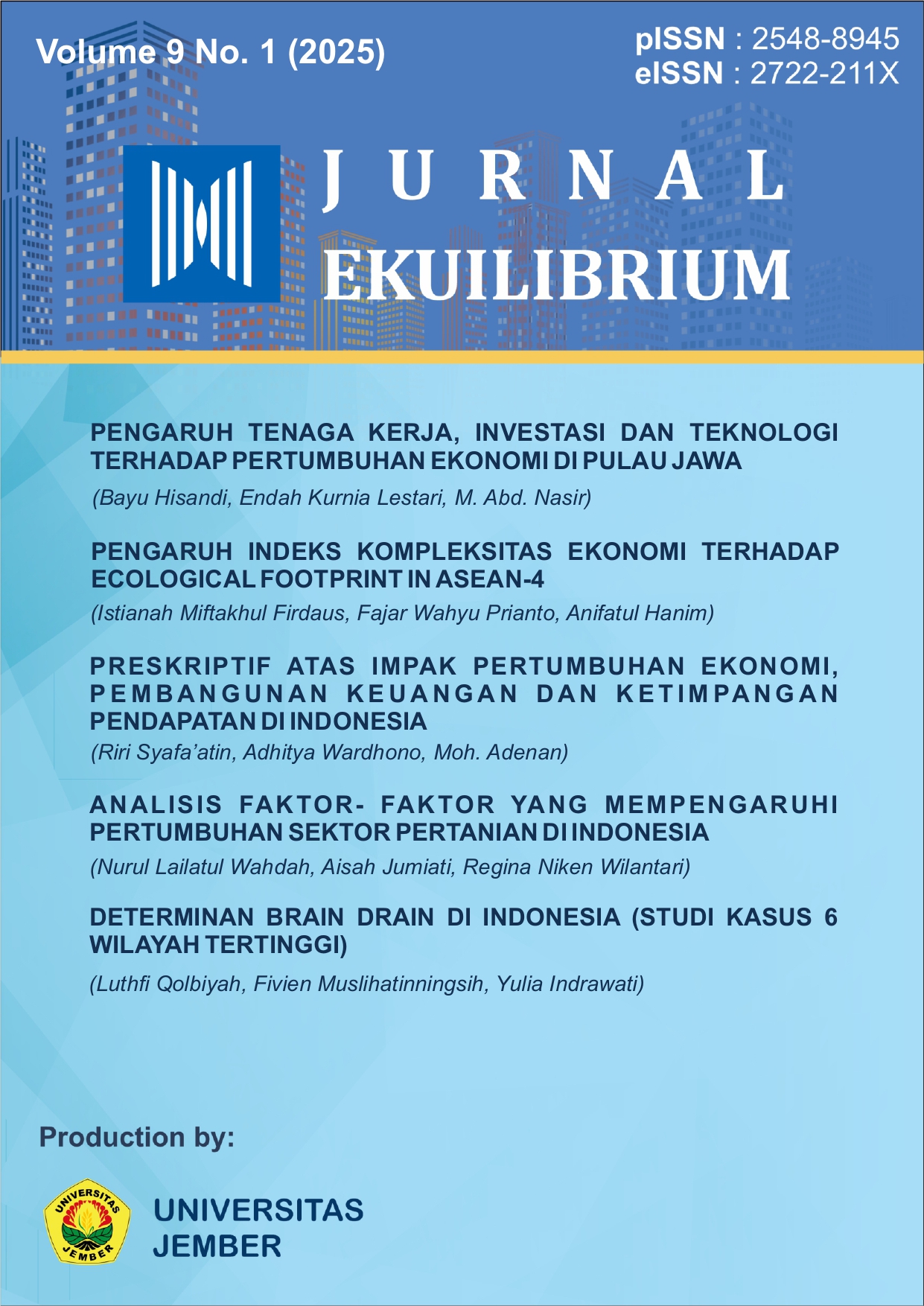PENGARUH KOMPLEKSITAS EKONOMI TERHADAP ECOLOGICAL FOOTPRINT DI ASEAN-4
DOI:
https://doi.org/10.19184/jek.v9i1.41829Keywords:
ASEAN-4, Economic Complexity, Ecological Footprint, Goverment ExpenditureAbstract
This study aims to analyze and determine the effect of economic complexity and government spending on the ecological footprint of ASEAN-4. The data used is the time series for the period 2011-2021 and cross sections with four ASEAN countries, which consist of Indonesia, Malaysia, Thailand, and Vietnam. Source of research data is World Bank, OEC, and Global Footprint Network. The focus of this research is to use panel data regression analysis with a random effect model (REM). The results of the research are Economic complexity has a significant positive effect on the ecological footprint in ASEAN-4. Meanwhile, government expenditure has a significant negative effect on the ecological footprint in ASEAN-4.
Downloads
References
Bello, M. O., Solarin, S. A., & Yen, Y. Y. (2018). The impact of electricity consumption on CO2 emission, carbon footprint, water footprint and ecological footprint: the role of hydropower in an emerging economy. Journal of environmental management, Vol.219, 218-230.
Bhattacharjee, P. K. (2010). Global Warming Impact on the Earth. International Journal of Environmental Science and Development, Vol.1(3), 219.
Forrest, W., & Morison, A. (1991). A government role in better environmental management. The Science of the Total Environment, Vol.108(1-2), 51-60.
Guerrero, O., & Castañeda, G. (2020). How does government expenditure impact sustainable development? Studying the multidimensional link between budgets and development gaps. Sustainability Science, Vol. 17(3), 987-1007.
Gujarati, D. (2004). Basic Econometrics. 4th Edition. Singapore: McGraw-Hill Companies.
Hausmann, R., Hidalgo, C. A., Bustos, S., Coscia, M., Simoes, A., & Yildirim, M. A. (2014). The Atlas Of Economic Complexity: Mapping Paths To Prosperity. Mit Press.
Hidalgo, C. A. (2021). Economic complexity theory and applications. Nature Reviews Physics, 3(2), 92-113.
Ikram, M., Xia, W., Fareed, Z., Shahzad, U., & Rafique, M. (2021). Exploring the nexus between economic complexity, economic growth and ecological footprint: Contextual evidences from Japan. Sustainable Energy Technologies and Assessments, 101532.
Jiang, K., Fu, B., Luo, Z., Xiong, R., Men, Y., Shen, H., et al. (2022). Attributed radiative forcing of air pollutants from biomass and fossil burning emissions. Environmental Pollution,, Vol.306, 119378.
Kusnarno, T., & Suratman, E. (2021). Analysis of the Factors Affecting the Competitiveness of ASEAN-5. Asian Journal of Social Science Studies, Vol.6(1), 1.
Marzuki, C. (1999). Metodologi Riset. Jakarta: Erlangga.
Nasir, M., Duc Huynh, T., & Xuan Tram, H. (2019). Role of financial development, economic growth & foreign direct investment in driving climate change: A case of emerging ASEAN. Journal of Environmental Management, Vol.242, 131-141.
Nathaniel. (2021). Economic complexity versus ecological footprint in the era of globalization: evidence from ASEAN countries. Environmental Science and Pollution Research,, Vol. 28(45), 64871-64881.
Rafique, M. Z., Nadeem, A. M., Xia, W., Ikram, M., Shoaib, H. M., & Shahzad, U. (2022). Does economic complexity matter for environmental sustainability? Using ecological footprint as an indicator. 24.
Shahzad, U., & Fareed, Z. (2021). Investigating the nexus between economic complexity, energy consumption and ecological footprint. Journal of Cleaner Production, Vol.279, 123806.
Susanti, E. D. (2018). Environment Kuznet Curve: Hubungan Pertumbuhan Ekonomi dengan Degradasi Kualitas Lingkungan Udara dalam Pencapaian Millenium Development Goals (MDGs) di Indonesia. Universitas Negeri Yogyakarta, Vol.15(2), 2017–2019.
Wackernagel, M., & Rees, W. (1998). Our Ecological Footprint: Reducing Human Impact on the Earth. New Society Publishers.
Ward, D., Shevliakova, E., Malyshev, S., & Rabin, S. (2018). Trends and Variability of Global Fire Emissions Due To Historical Anthropogenic Activities. Global Biogeochemical Cycles, Vol.32, 122– 142.
Zeraibi, A., Balsalobre-Lorente, D., & Murshed, M. (2021). The influences of renewable electricity generation, technological innovation, financial development, and economic growth on ecological footprints in ASEAN-5 countries. Environmental Science and Pollution Research, Vol.28(37), 51003-51021.
Downloads
Published
Issue
Section
License
Copyright (c) 2025 Jurnal Ekuilibrium

This work is licensed under a Creative Commons Attribution 4.0 International License.
Authors who submit their manuscripts to be processed for publication at JEK should agree with following points:
1. The author cannot withdraw the manuscript that has been proposed for processing until it receives an answer from the Chief Editor regarding the status of the scientific article manuscript (accepted or rejected for publication).
2. The publisher is not responsible for plagiarism cases for articles published on JEK.
3. The publisher is not responsible for the data and content of articles published on JEK, and is entirely the responsibility of the author.
4. Authors whose articles are published on JEK agree to the following CC-BY license.

JEK by University of Jember is licensed under a Creative Commons Attribution-NonCommercial 4.0 International License.



